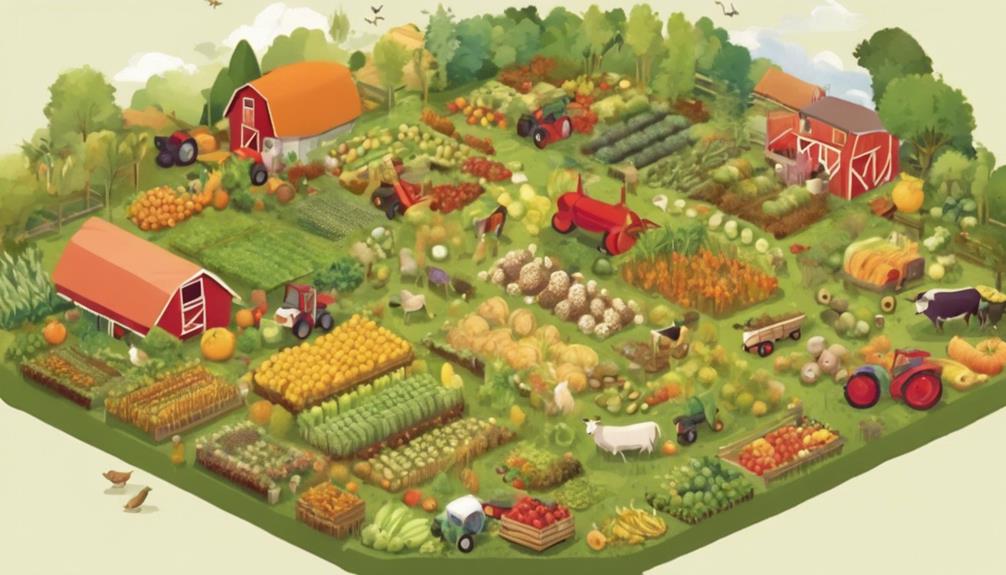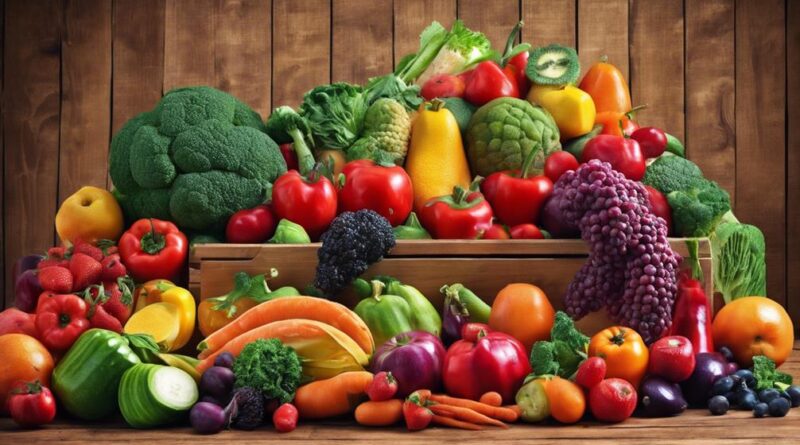How Natural Food Supply Influences Our Health
So you think that the food you eat has no impact on your health? Think again.
The connection between natural food supply and your well-being is more significant than you might realize.
From the soil in which it grows to the way it reaches your plate, each step influences your health in ways you might not have considered.
Stay tuned to uncover the hidden truths about how the natural food supply chain can shape your overall health and vitality.
Benefits of Organic Food Supply
Organic food supply offers numerous health benefits due to its natural cultivation methods and absence of harmful chemicals. By choosing organic foods, you're reducing your exposure to pesticides, antibiotics, and genetically modified organisms that are commonly found in conventionally grown produce. This decreased exposure can contribute to lower risks of developing various health issues such as allergies, hormonal imbalances, and certain types of cancers.
Furthermore, opting for organic food supply not only benefits your health but also has a positive environmental impact. Organic farming practices promote soil health, biodiversity, and water conservation. When you support organic agriculture, you're choosing a sustainable approach that helps preserve ecosystems and reduces pollution. This choice contributes to a healthier planet for current and future generations.
Incorporating organic foods into your diet can lead to better overall well-being, as you're providing your body with nutrient-dense options free from harmful additives. Additionally, you're supporting environmentally friendly practices that prioritize both human health and the health of the planet. Making the switch to organic food may require some adjustments, but the long-term benefits for your health and the environment make it a worthwhile investment in your well-being.
Importance of Organic Certification
Shifting focus to the verification and assurance of organic farming practices, understanding the importance of organic certification becomes crucial in guaranteeing the integrity of the food supply chain. Organic certification ensures that food is produced in ways that promote soil health and have a lower environmental impact. By adhering to strict guidelines, organic certification supports sustainable agriculture practices that help maintain the fertility of the soil, reduce erosion, and minimize pollution.
Moreover, organic certification plays a vital role in safeguarding consumer health. Organic foods are grown without synthetic pesticides, herbicides, and genetically modified organisms, reducing the risk of exposure to harmful chemicals. This contributes to improved food safety and lower pesticide residues in the final products. Additionally, organic farming practices often prioritize animal welfare and biodiversity conservation, further enhancing the health benefits of organic foods.
When you choose organic certified products, you aren't only making a decision that impacts your health positively but also supporting environmentally friendly agricultural practices. The certification process involves regular inspections and audits to ensure that farmers comply with organic standards, providing consumers with confidence in the authenticity of the organic label. By prioritizing organic certification, you aren't just choosing a healthier option but also contributing to a more sustainable and ethical food system.
Challenges in Organic Food Distribution
What hurdles do farmers encounter when distributing organic food to consumers?
One of the main challenges faced in organic food distribution is logistical hurdles. Unlike conventional farming, organic farms are often smaller in scale and more dispersed. This can make it difficult to consolidate products for distribution efficiently. Additionally, organic farming practices can be more labor-intensive and time-consuming, leading to potential delays in getting products to market.
Another significant challenge is meeting the market demand for organic products. As the popularity of organic food continues to rise, farmers must keep up with the increasing demand. This can be a delicate balance, as scaling up production too quickly can compromise the integrity of organic practices. Furthermore, farmers may struggle to find the right distribution channels to reach consumers who are interested in buying organic.
Impact of Organic Farming Practices
Amidst the evolving landscape of agriculture, the practices employed by organic farmers have a profound impact on both the environment and consumer health. Organic farming practices prioritize soil health by avoiding synthetic pesticides and fertilizers, which can degrade soil quality over time. Instead, organic farmers focus on crop rotation, composting, and natural fertilizers to maintain soil fertility and structure. By nurturing the soil, organic farming helps to preserve essential microorganisms, earthworms, and other beneficial organisms that support plant growth and overall ecosystem health.
Furthermore, organic farming practices promote nutrient density in crops. Studies have shown that organically grown fruits and vegetables tend to have higher levels of vitamins, minerals, and antioxidants compared to conventionally grown produce. This difference can be attributed to the emphasis on soil health in organic farming, as healthy soils produce nutrient-rich crops. By consuming organic foods with higher nutrient density, you can potentially enhance your overall health and well-being.
Role of Organic Food Suppliers
Organic food suppliers play a crucial role in ensuring the availability of nutrient-dense produce that supports both environmental sustainability and consumer health. By focusing on sustainable sourcing practices, organic food suppliers prioritize methods that minimize harm to the environment, such as avoiding synthetic pesticides and fertilizers that can pollute soil and water systems. This commitment to sustainability not only benefits the planet but also results in healthier, more wholesome food for consumers.
Furthermore, organic food suppliers often embrace farm-to-table initiatives, which involve directly sourcing products from local farmers and producers. This not only supports local economies but also ensures that the produce is fresh, minimally processed, and retains its nutritional value. By shortening the supply chain, organic food suppliers can offer consumers fruits, vegetables, and other products that are at the peak of freshness and flavor.
Through their dedication to sustainable practices and farm-to-table initiatives, organic food suppliers contribute to a healthier food system that prioritizes both the well-being of consumers and the environment. By choosing to support these suppliers, you aren't only making a positive impact on your health but also supporting a more sustainable and ethical approach to food production.
Consumer Awareness on Organic Products
Embracing the benefits of organic products starts with understanding their impact on your health and the environment. When you choose organic products, you aren't only making a healthy choice for yourself but also supporting sustainable farming practices that have a lower environmental impact.
Organic products are free from synthetic pesticides and fertilizers, reducing your exposure to harmful chemicals that can have long-term health effects. By opting for organic fruits, vegetables, and other food items, you're providing your body with nourishment that's free from potentially harmful residues.
Moreover, organic farming practices promote soil health, water conservation, and biodiversity, contributing to a healthier environment for all living beings. Choosing organic products means supporting farmers who prioritize sustainability and ethical practices in their operations.
In addition to the health benefits of consuming organic products, you're also playing a role in reducing the overall environmental impact of food production. Organic farming methods help to preserve natural resources, protect wildlife habitats, and decrease pollution of air, soil, and water.
Sustainability in Organic Food Chain

To truly understand the impact of organic products on sustainability within the food chain, you must consider the interconnected relationship between farming practices, environmental health, and long-term food security. Organic farming practices have a significant environmental impact, promoting biodiversity, reducing pollution, and conserving water and soil quality. By choosing organic products, you actively support ethical sourcing, which prioritizes fair treatment of workers, animal welfare, and sustainable farming methods.
Key Points:
- Environmental Impact: Organic farming practices have a positive impact on the environment by promoting biodiversity, reducing pollution, and conserving water and soil quality.
- Ethical Sourcing: Choosing organic products supports ethical sourcing practices, ensuring fair treatment of workers, prioritizing animal welfare, and promoting sustainable farming methods.
- Long-Term Sustainability: By supporting organic food chains, you contribute to long-term food security by preserving natural resources and fostering a more sustainable food system.
Future Trends in Organic Food Industry
With consumers increasingly seeking healthier and sustainable food options, the organic food industry is poised for significant growth and innovation in the coming years. Market growth in the organic food sector is expected to surge as more individuals prioritize health and environmental concerns. This shift towards organic products is driven by a growing awareness of the benefits of consuming pesticide-free and non-GMO foods.
One of the key factors driving this market growth is the increasing availability and accessibility of organic products. As demand rises, more farmers are transitioning to organic farming methods to meet the market needs. This expansion of organic farming practices not only boosts the supply of organic foods but also helps in reducing the environmental impact of traditional agriculture.
Moreover, technological advancements play a crucial role in shaping the future of the organic food industry. Innovations in farming techniques, such as precision agriculture and vertical farming, are revolutionizing the way organic produce is cultivated. These advancements not only increase efficiency in production but also ensure higher quality and yield of organic crops.
Frequently Asked Questions
What Are Some Common Misconceptions About Organic Food Supply That Consumers Should Be Aware Of?
When it comes to organic food supply, consumers should be aware of common misconceptions to make informed choices. Labeling requirements ensure transparency, but not all organic products are pesticide-free. Some pesticides are allowed in organic farming.
Consumer trust is crucial, but it's essential to research and not blindly believe all labels. Health concerns related to pesticide residues exist, so understanding the regulations and practices in the organic industry is key for informed decisions.
How Do Environmental Factors Like Climate Change and Soil Degradation Affect the Availability and Quality of Organic Food?
When it comes to organic food, environmental factors like climate change and soil degradation play a significant role in determining the availability and quality of these products.
Impact of pesticides can harm the ecosystem, affecting the organic food supply chain.
Climate smart agriculture practices are essential to combat these challenges and ensure sustainable production.
Are There Any Emerging Technologies or Innovations in the Organic Food Industry That Could Revolutionize the Way Organic Products Are Produced and Distributed?
If you're curious about the future of organic food production, look into vertical farming and sustainable packaging.
Innovations like blockchain tracking and precision agriculture are transforming the industry.
These advancements are revolutionizing how organic products are grown and distributed.
Stay informed on these emerging technologies to see how they shape the way organic food is produced and brought to your table in the coming years.
How Do Government Policies and Regulations Impact the Organic Food Supply Chain, and What Changes Are Being Proposed to Support Sustainable Farming Practices?
Government policies and regulations play a crucial role in shaping the organic food supply chain. They impact the practices of sustainable farming and help ensure the integrity of organic products.
Proposed changes aim to support more environmentally friendly farming methods and promote greater transparency in the organic food industry.
Consumer awareness is key in dispelling misconceptions about organic food supply, allowing for informed choices that benefit both health and the environment.
What Are Some Potential Risks or Challenges That Could Threaten the Stability and Growth of the Organic Food Industry in the Future?
In the future, you may face supply challenges due to unpredictable weather patterns and limited resources. Market competition could intensify, making it harder to stand out.
Balancing consumer demand for organic products with maintaining food safety standards might pose a challenge. Stay vigilant and adapt to changing trends to ensure the stability and growth of the organic food industry.
Conclusion
In conclusion, choosing organic food supply can greatly benefit your health by providing nutrient-rich and chemical-free options.
By supporting organic farming practices and sustainable food chains, you can contribute to a healthier environment and a more sustainable future.
Stay informed about organic certifications and suppliers to make conscious choices that positively impact your well-being.
Embrace the natural goodness of organic food for a healthier you.
